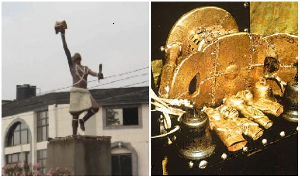The heart of the Ashanti Kingdom was on display on Sunday, May 12, 2024, at this year's fourth Akwasidae, a festival celebrated every six months to commemorate the time that the Golden Stool was magically brought down from heaven.
The fourth Akwasidae of 2024 was special because the Golden Stool was displayed for the first time in many years as part of the 25th-anniversary celebration of the installation of Otumfuo Osei Tutu II as Asantehene.
The Golden Stool, also known as Sika Dwa Kofi, was placed on a separate seat beside Otumfuo Osei Tutu II.
In fact, Sika Dwa Kofi was ushered onto the durbar grounds in the same manner as the Asantehene.
Questions have been asked on why the Otumfuo did not sit on the Golden Stool, why the stool was placed on its own chair, and why it was given so much reverence.
Historian and lawyer Yaw Anokye Frimpong, in an interview with GTV’s Kafui Dey, gave the history behind the Golden Stool and how it was used by the legendary Asante fetish priest, the Great Okomfo Anokye, to ‘create’ the Ashanti Kingdom seen today.
According to Anokye Frimpong, Okomfo Anokye used the stool to stop the rotational leadership system that was in place in the Ashanti Kingdom, making his friend, Osei Tutu, the undoubted leader of the Asantes.
“He (Okomfo Anokye) wanted his friend Osei Tutu to become the unquestionable leader… He told them (the Akan states) that on this particular Friday, everyone was supposed to come to Kumasi, the new capital, and the gods would reveal an unquestionable leader so that there would be no more rotation,” Anokye Frimpong said.
He said that Okomfo Anokye made all the leaders of the states bury their stools, which were the source of their power, and manufactured the Golden Stool in Kumasi, making it the oldest stool, and the chief of Kumasi the leader of the Asantes.
He added that the Golden Stool became the soul of the Asantes and all the states were prepared to fight for it.
“At first, it (the kinship of the kingdom) rotated among the various eight Akan clans: the Oyoko, Bretuo, Agona, Asona, Asenie, Aduana, Ekuona, and Asakyiri… Okomfo Anokye asked all the states forming Asante to bring their black stools. So, when they brought the stools, Okomfo Anokye performed whatever he performed. He told them that the gods said they should dig a big hole. They dug the hole, and after that, he said, ‘Everyone should put in his black stool.’
“They put in their black stools, and then he covered it, and then he said our gods are going to reveal to us a stool of all stools - a stool that would represent all the stools down there (in the hole) and which everyone would have to fight for, which would never have to depart from you and which, unlike the stools you have buried, should never be sat on by anybody. That stool itself would have to sit on another stool,” the historian said.
He added, “So, the Golden Stool came about either from heaven, as the Ashanti oral tradition tells us, or wherever it came from, the truth is that the Golden Stool is still there… The sunsum (soul) of the Asante Nation is in this stool and no other. It is so sacred that the stool should never touch the earth. And it is worshipped as a god.”
Watch his remarks below:
Watch the latest episode of Everyday People below:
Ghana’s leading digital news platform, GhanaWeb, in conjunction with the Korle-Bu Teaching Hospital, is embarking on an aggressive campaign which is geared towards ensuring that parliament passes comprehensive legislation to guide organ harvesting, organ donation, and organ transplantation in the country.
BAI/AE
Watch the latest episode of Everyday People below:
Ghana’s leading digital news platform, GhanaWeb, in conjunction with the Korle-Bu Teaching Hospital, is embarking on an aggressive campaign which is geared towards ensuring that parliament passes comprehensive legislation to guide organ harvesting, organ donation, and organ transplantation in the country.
General News of Monday, 13 May 2024
Source: www.ghanaweb.com













